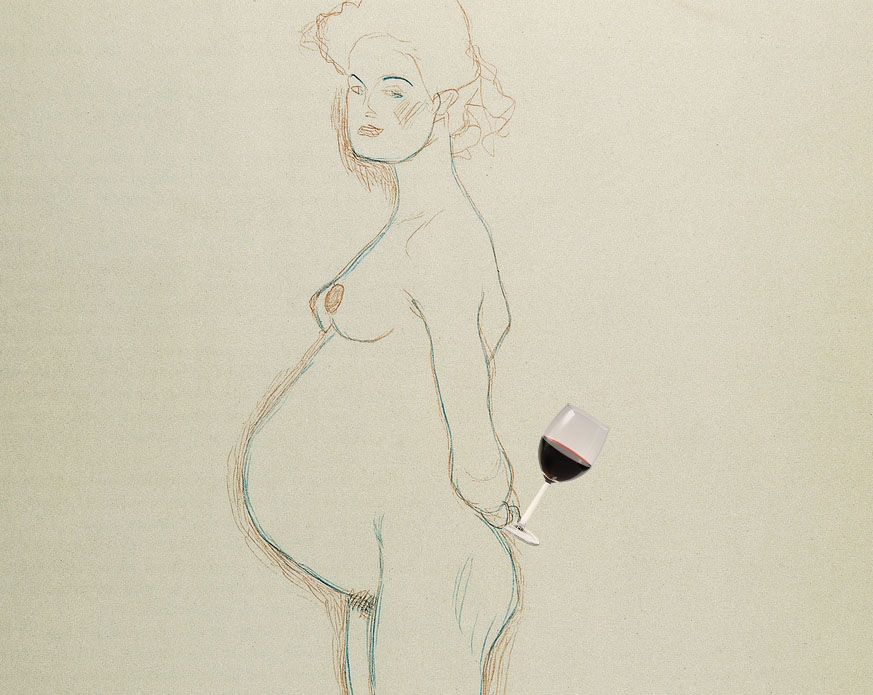This Mother’s Day, I’d like to raise a mocktail to all the mothers-to-be, to all of us united in suffering the joys and the indignities of pregnancy, stone-cold sober.
As my own mother tells it, she knew she was pregnant with me, her firstborn, when she got disproportionately sick from one gin and tonic. When I, in turn, pushed away a glass of Côte de Beaune at the dinner table, I knew something was up. Now, twenty-one weeks in, I wish I could go back to that night, back when it still didn’t count, and finish my glass of chardonnay. What was I thinking? I just wasn’t thinking.
Halfway into my pregnancy, with another whole half to go, all I want to do is drink. I would give anything for a chilled glass of wine or an Aperol spritz or, hell, even a Heineken. It seems patently unfair that my partner can sit there drinking his Leffe, while I’m consoling myself with a sparkling lemonade. It’s especially bad when I go on Instagram, where it seems everyone these days spends their afternoons sipping Negronis, ruby liquid shimmering in the new spring light. It’s a beautiful spring day in Paris, but when I step outside, because I’m not drinking, it feels like just another day. Why does an alcoholic beverage feel like the only way to celebrate the return of warm weather?
France is to blame, as well as Instagram; I’ve lived for nearly two decades in a country where the whole culture is organized around the consumption of alcohol in public places, no matter what the time of day. I decided to move here one morning in 1999 when, sitting in a sun-drenched town square on my junior year abroad, during an organized meet and greet with the local French university students, they ordered demi-pêches for us: half a pint of lager with a shot of peach syrup. “At eleven A.M.??” we gasped, scandalized and seduced.
But don’t believe the hype—that laissez-faire attitude stops the minute you learn you’re pregnant. French doctors most emphatically do not tell you it’s okay to have a glass of wine every now and then. In the waiting room at the clinic where I’m going to give birth, there’s a poster of a fetus floating in a glass of red wine. Below it are written the words: WHEN YOU DRINK A LITTLE, YOU BABY DRINKS A LOT.
Drinking is, at its best, a social activity, a collective one. But so is pregnancy—you’re never pregnant alone, you are pregnant along with every other woman who is or ever has been. There’s strength in that. But it also means that we’re all anxiously keeping watch over expectant mothers, defining ourselves or each other by the choices we make. Motherhood comes with enough judgment, and I don’t want to open the who’s-doing-what can of worms. I’m having a dry pregnancy, and that is no shade on anyone who hasn’t, or didn’t; it’s just the only possible response I find I can make to the state I’m in. No doubt I’ve internalized the ways in which society is constantly trying to exert control over the female body, but I just can’t see myself sitting somewhere with a big pregnant belly and a glass of wine in my hand. To me, it would feel unseemly, a step away from ripping into a pack of Marlboro Lights and smoking them one by one, in between bites of unpasteurized cheese. It doesn’t matter that some studies show a glass of wine a week isn’t really that harmful; they don’t know for sure, and that’s enough for me.
It’s not even the actual drink I’m after. If it were about the alcohol itself, I might allow myself a tiny bit every now and then. But I don’t just want a sip, I want the whole experience. I want to languish on a café terrace with a glass of rosé on the rocks, chatting with a friend, picking our way through the little dish of olives. I want to disengage from responsibility, to yield to easy sociability, to the heaviness in my bloodstream, relaxing into the heat. I want the freedom to enjoy, to detach. But getting pregnant is not about freedom. It’s a parentheses, an intermediate period where the little one can never be left with his father for an afternoon—he’s on board, doing everything I do, drinking everything I drink.
For a woman in her late thirties, getting pregnant is a triumph. But the long haul of pregnancy—some aspects too slow, others too fast—doesn’t feel triumphant. It’s a tiring series of choices, some major, some unbelievably minor: Should I have an epidural? Should we get this crib or that one? Can I have a toasted ham-and-cheese sandwich at the local coffee shop chain? It’s as if we can’t quite come to grips with the curb we’ve placed on our own freedom and have to carry out these micro-negotiations with ourselves to prove we still have room to maneuver.
It comes down to this: it’s spring time, and I want to drink. I’m pregnant, I’m happy to have been able to conceive, I have no right to complain, but I want to driiiiiink. The act of becoming a parent has turned me into my own child. Perhaps it’s good practice when I tell myself: No, Lauren, you can’t have a drink. All the other boys and girls are drinking, I know, but you can’t right now. You can have one later. If you behave.
Lauren Elkin is the author of Flâneuse: Women Walk the City. She lives in Paris.
from The Paris Review https://ift.tt/2rwoyp1

Comments
Post a Comment